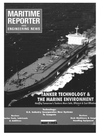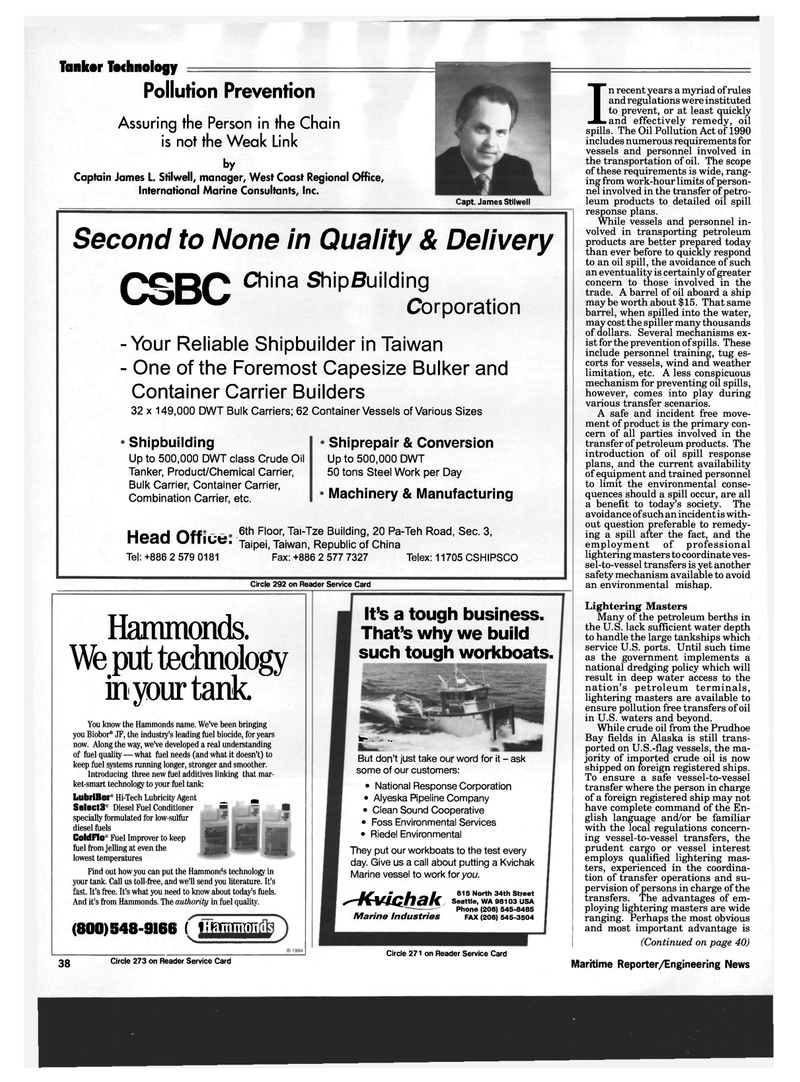
Page 36: of Maritime Reporter Magazine (May 1994)
Read this page in Pdf, Flash or Html5 edition of May 1994 Maritime Reporter Magazine
Tanker Technology
Pollution Prevention
Assuring the Person in the Chain is not the Weak Link by
Captain James L. Stilwell, manager, West Coast Regional Office,
International Marine Consultants, Inc.
Capt. James Stilwell
Second to None in Quality & Delivery popp China ShipSuilding ^^^ Corporation -Your Reliable Shipbuilder in Taiwan - One of the Foremost Capesize Bulker and
Container Carrier Builders 32 x 149,000 DWT Bulk Carriers; 62 Container Vessels of Various Sizes
Shipbuilding
Up to 500,000 DWT class Crude Oil
Tanker, Product/Chemical Carrier,
Bulk Carrier, Container Carrier,
Combination Carrier, etc.
Shiprepair & Conversion
Up to 500,000 DWT 50 tons Steel Work per Day
Machinery & Manufacturing
HpaH Off6th Floor' Ta'~Tze Building, 20 Pa-Teh Road, Sec. 3, ncdU VJIIlUt?. Taipei, Taiwan, Republic of China
Tel:+886 2 579 0181 Fax: +886 2 577 7327 Telex: 11705 CSHIPSCO
Circle 292 on Reader Service Card
Hammonds.
We put technology in your tank
You know the Hammonds name. We've been bringing you Biobor® JF, the industry's leading fuel biocide, for years now. Along the way, we've developed a real understanding of fuel quality — what fuel needs (and what it doesn't) to keep fuel systems running longer, stronger and smoother.
Introducing three new fuel additives linking that mar- ket-smart technology to your fuel tank:
LubriBor * Hi-Tech Lubricity Agent _ —
Select3 Diesel Fuel Conditioner specially formulated for low-sulfur diesel fuels
ColdFlo Fuel Improver to keep fuel from jelling at even the lowest temperatures
Find out how you can put the Hammonds technology in your tank. Call us toll-free, and we'll send you literature. It's fast. It's free. It's what you need to know about today's fuels.
And it's from Hammonds. The authority in fuel quality. (800)548-9166 ( liEffiffitnT
In recent years a myriad of rules and regulations were instituted to prevent, or at least quickly and effectively remedy, oil spills. The Oil Pollution Act of 1990 includes numerous requirements for vessels and personnel involved in the transportation of oil. The scope of these requirements is wide, rang- ing from work-hour limits of person- nel involved in the transfer of petro- leum products to detailed oil spill response plans.
While vessels and personnel in- volved in transporting petroleum products are better prepared today than ever before to quickly respond to an oil spill, the avoidance of such an eventuality is certainly of greater concern to those involved in the trade. A barrel of oil aboard a ship may be worth about $15. That same barrel, when spilled into the water, may cost the spiller many thousands of dollars. Several mechanisms ex- ist for the prevention of spills. These include personnel training, tug es- corts for vessels, wind and weather limitation, etc. A less conspicuous mechanism for preventing oil spills, however, comes into play during various transfer scenarios.
A safe and incident free move- ment of product is the primary con- cern of all parties involved in the transfer of petroleum products. The introduction of oil spill response plans, and the current availability of equipment and trained personnel to limit the environmental conse- quences should a spill occur, are all a benefit to today's society. The avoidance of such an incident is with- out question preferable to remedy- ing a spill after the fact, and the employment of professional lightering masters to coordinate ves- sel-to-vessel transfers is yet another safety mechanism available to avoid an environmental mishap.
It's a tough business.
That's why we build such tough workboats. te- ,..
But don't just take our word for it - ask some of our customers: • National Response Corporation • Alyeska Pipeline Company • Clean Sound Cooperative • Foss Environmental Services • Riedel Environmental
They put our workboats to the test every day. Give us a call about putting a Kvichak
Marine vessel to work for you. ^Kvichak
Marine Industries 615 North 34th Street
Seattle, WA 98103 USA
Phone (206) 545-8485
FAX (206) 545-3504 38 Circle 273 on Reader Service Card
Circle 271 on Reader Service Card
Lightering Masters
Many of the petroleum berths in the U.S. lack sufficient water depth to handle the large tankships which service U.S. ports. Until such time as the government implements a national dredging policy which will result in deep water access to the nation's petroleum terminals, lightering masters are available to ensure pollution free transfers of oil in U.S. waters and beyond.
While crude oil from the Prudhoe
Bay fields in Alaska is still trans- ported on U.S.-flag vessels, the ma- jority of imported crude oil is now shipped on foreign registered ships.
To ensure a safe vessel-to-vessel transfer where the person in charge of a foreign registered ship may not have complete command of the En- glish language and/or be familiar with the local regulations concern- ing vessel-to-vessel transfers, the prudent cargo or vessel interest employs qualified lightering mas- ters, experienced in the coordina- tion of transfer operations and su- pervision of persons in charge of the transfers. The advantages of em- ploying lightering masters are wide ranging. Perhaps the most obvious and most important advantage is (Continued on page 40)
Maritime Reporter/Engineering News

 35
35

 37
37
